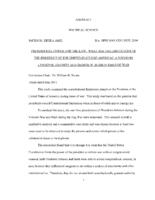- Collection:
- Atlanta University and Clark Atlanta University Theses and Dissertations
- Title:
- Presidential power and the law: what are the limitations of the president of the United States of America? a focus on Lyndon B. Johnson and George W. Bush in time of war, 2011
- Creator:
- Jackson, Keyla Amil
- Date of Original:
- 2011-05-01
- Subject:
- Degrees, Academic
Dissertations, Academic - Location:
- United States, Georgia, Fulton County, Atlanta, 33.749, -84.38798
- Medium:
- theses
- Type:
- Text
- Format:
- application/pdf
- Description:
- This study examined the constitutional limitations placed on the President of the United States of America during times of war. This study was based on the premise that presidents exceed Constitutional limitations when in times of crisis and or emergency. To conduct this study, the war time presidencies of Presidents Johnson during the Vietnam War and Bush during the Iraq War were examined. This research is both a qualitative analysis and a comparative case study and was chosen because at least two cases need to be observed to study the persons and events which pertain to the substantive issues to be explored. The researcher found that even though it is clear that the United States Constitution limits the power of the president to initiate war without congressional consent, both President Johnson and Bush were able to secure congressional consent, in part, because they influenced congress to act within a context of uncertainty and often misinformation. Therefore, they did not exceed their constitutionally granted authority they used the media, influence, public opinion and other factors to expand their presidential powers. The conclusion drawn from the findings suggest that given the Presidents control of intelligence that is often uncertain, political scientists need to research the practicality of providing Congress with an independent entity to cross check the intelligence provided by the President. Constitutional scholars should continue to explore presidential decisions to initiate war by authorizing law that force the executive branch to justify decisions to go to war. Also, the focus of research regarding the extra-constitutional use of war authority should shift to an analysis of what makes congress, the media, and the public so complicit when war is initiated.
- External Identifiers:
- Metadata URL:
- http://hdl.handle.net/20.500.12322/cau.td:2011_jackson_keyla_a
- Rights Holder:
- Clark Atlanta University
- Holding Institution:
- Atlanta University Center Robert W. Woodruff Library
- Rights:
-
